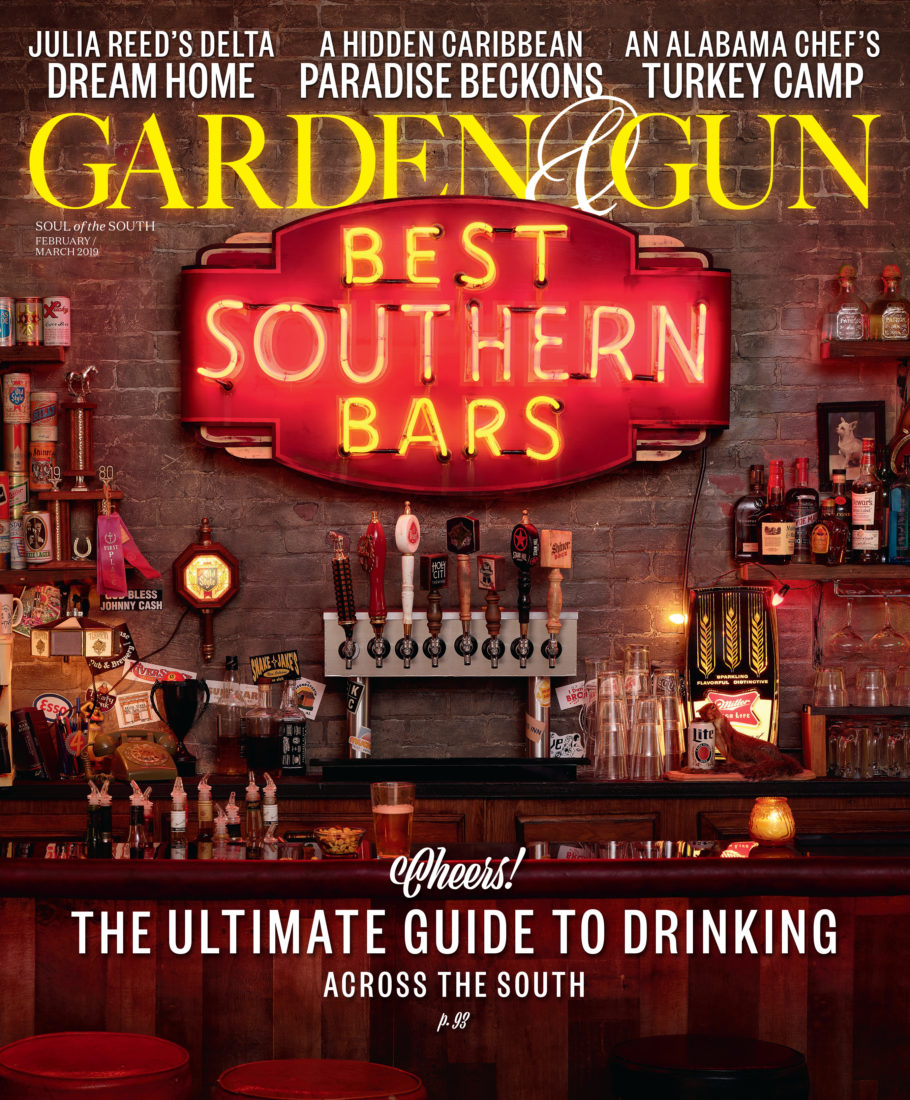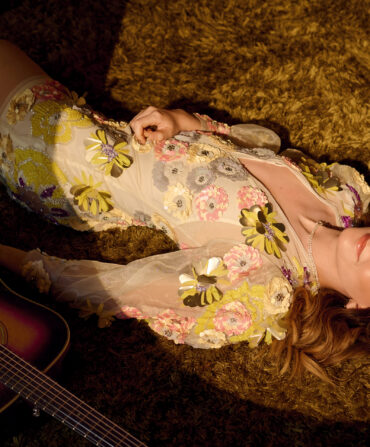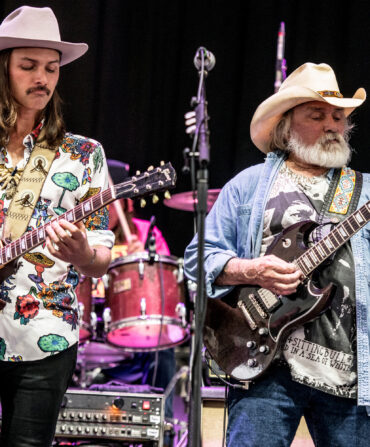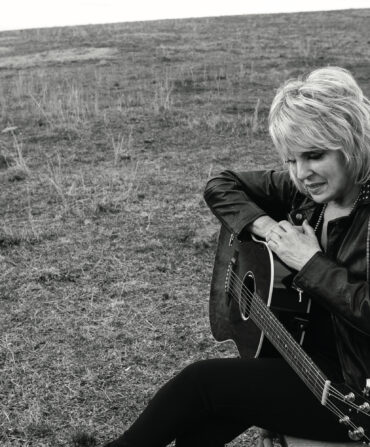Artists
Ranky Tanky: Keeping the Faith
The Charleston band taps its roots to bring Gullah music to the top of the charts
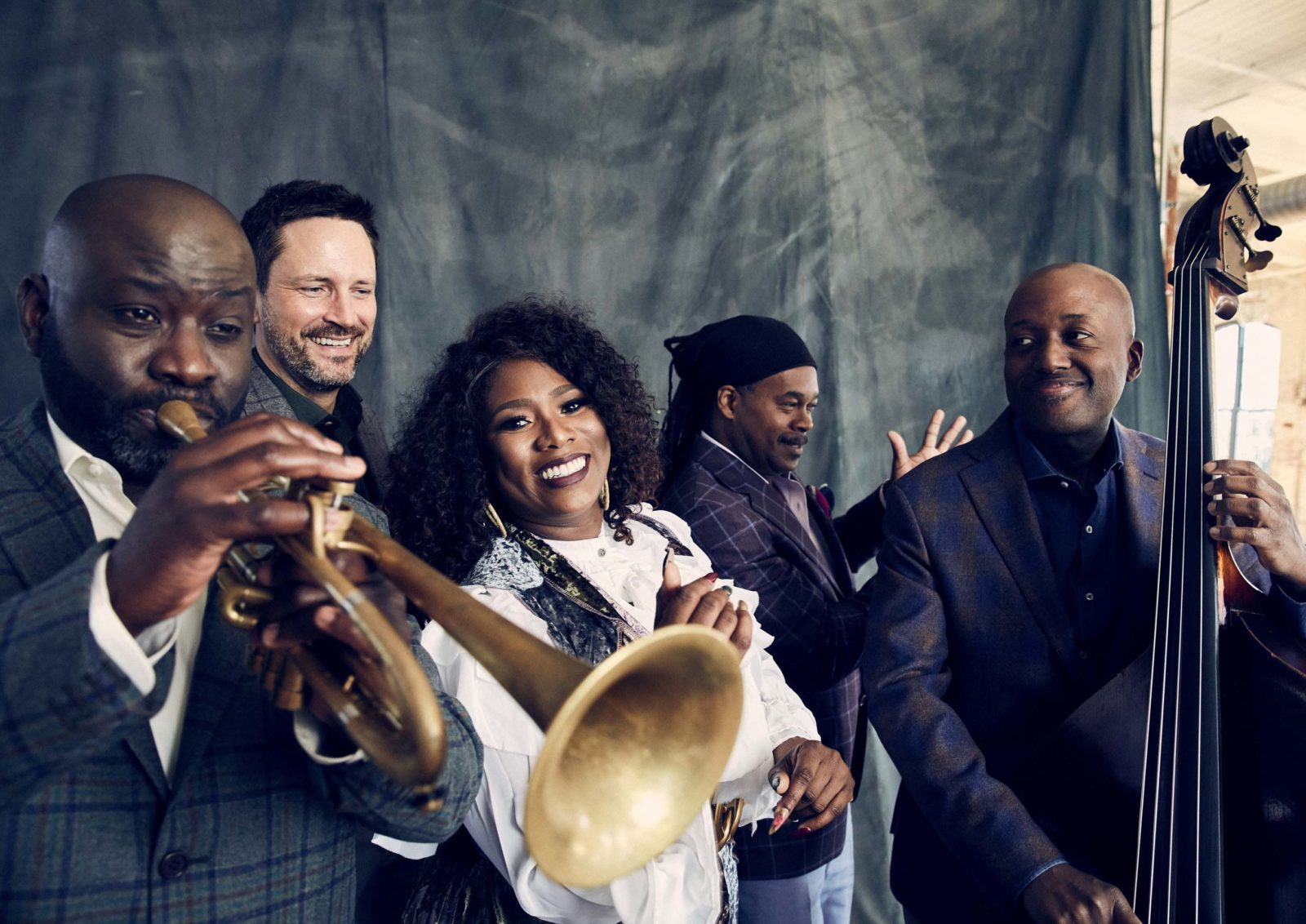
Photo: Sully Sullivan
The band Ranky Tanky—from left, Charlton Singleton, Clay Ross, Quiana Parler, Quentin Baxter, and Kevin Hamilton—photographed at the Cedar Room in Charleston, South Carolina.
No one in Ranky Tanky saw it coming. The glowing press, the uptick of fame, the nonstop touring, the chart-topping debut album, the…expedited service at Target.
“I’m not kidding,” says Quiana Parler, as she digs in to a brunch of sausage and pimento cheese grits at a Charleston, South Carolina, diner. “My son told the pharmacist I was in Ranky Tanky and she was like, ‘Oh, I’m gonna get your prescriptions right away!’” The thirty-nine-year-old tilts her head, smiles. “That was new.”
Charleston-based Ranky Tanky formed in May 2016, when five musician friends with shared personal and professional history dating back decades—trumpeter Charlton Singleton, drummer Quentin Baxter, guitarist Clay Ross, bassist Kevin Hamilton, and vocalist Parler—got together at Ross’s urging to record their interpretation of Gullah music, songs and spirituals passed on from those descended from enslaved people, primarily along the Georgia and South Carolina coasts, who developed their own language and culture thanks to their relative seclusion.
“When Clay approached us about Ranky Tanky, honestly the first thing I said was ‘Why would we go out and do Gullah?’” Singleton recalls, sitting beside Parler as he tears open a biscuit and slathers it with jam. “‘I can go to church right now and hear folks singing those songs.’”
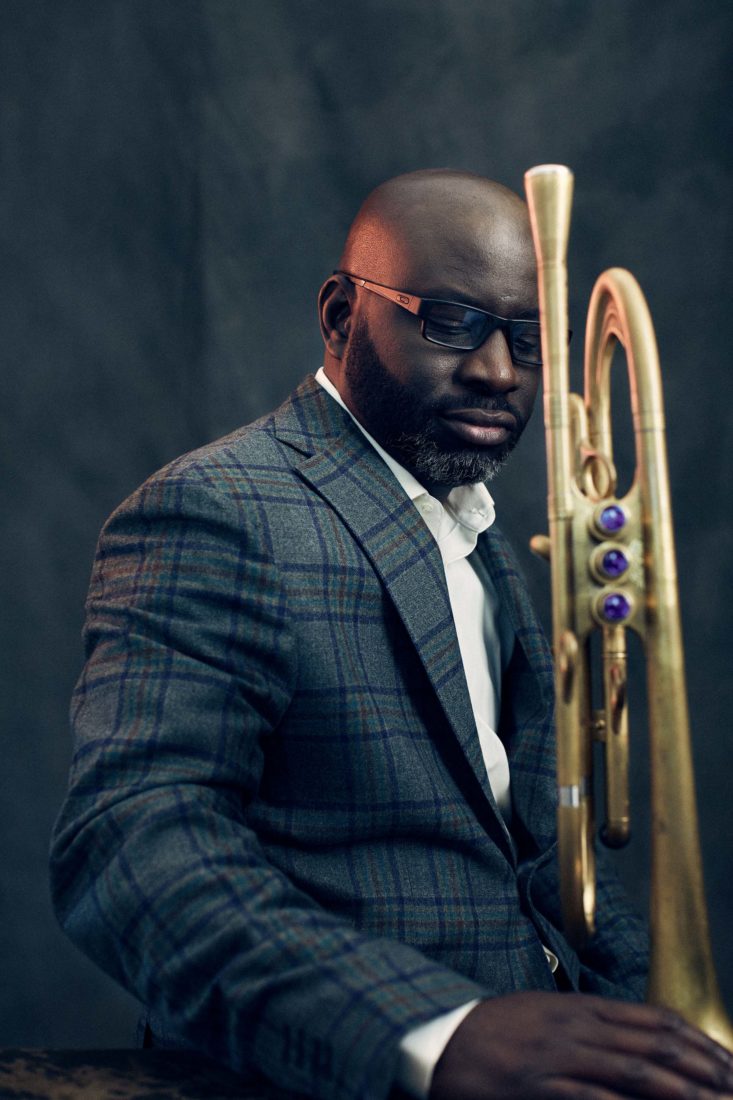
Photo: Sully Sullivan
Charlton Singleton, trumpeter.
Singleton, who is forty-eight, could not have predicted how their arrangements of age-old Gullah mainstays would penetrate a cluttered media landscape and resonate with listeners hungry for authenticity and mainlined soul. How the music of his youth and family would quench a thirst he never suspected existed beyond his backyard. “What I learned is that everybody can relate to it somehow,” he says. “In all of our travels, whether it’s us playing in Seattle or Nebraska or Northern Canada, everybody’s got some sort of turmoil that they’ve been through. And this music, coming from this community and those enslaved Africans, everybody can feel a piece of Ranky Tanky.” (The very name is an evocation of movement, meaning “work it” or “get funky.”)
Parler remembers thinking when she signed on that the band would book a few local gigs, perhaps some summer festivals. “The initial talk was maybe ten tour dates,” seconds Singleton, who at the time had just agreed to be the first artist in residence at Charleston’s Gaillard Center for the performing arts. But ten shows turned into twenty, then fifty. “And then it was five countries in Europe. I was like, ‘What?’”
“We went to the Czech Republic, and they were screaming ‘Ron-ky Ton-ky!’” says Parler, bemused still.
In October 2017, Ranky Tanky released their eponymous album, and by the end of January it had reached number one on both Billboard’s jazz and contemporary jazz charts—hopping over such artists as Van Morrison and Diana Krall on the way. The tour has yet to ebb. And the band has already recorded new music for their next album, to be released in early summer.
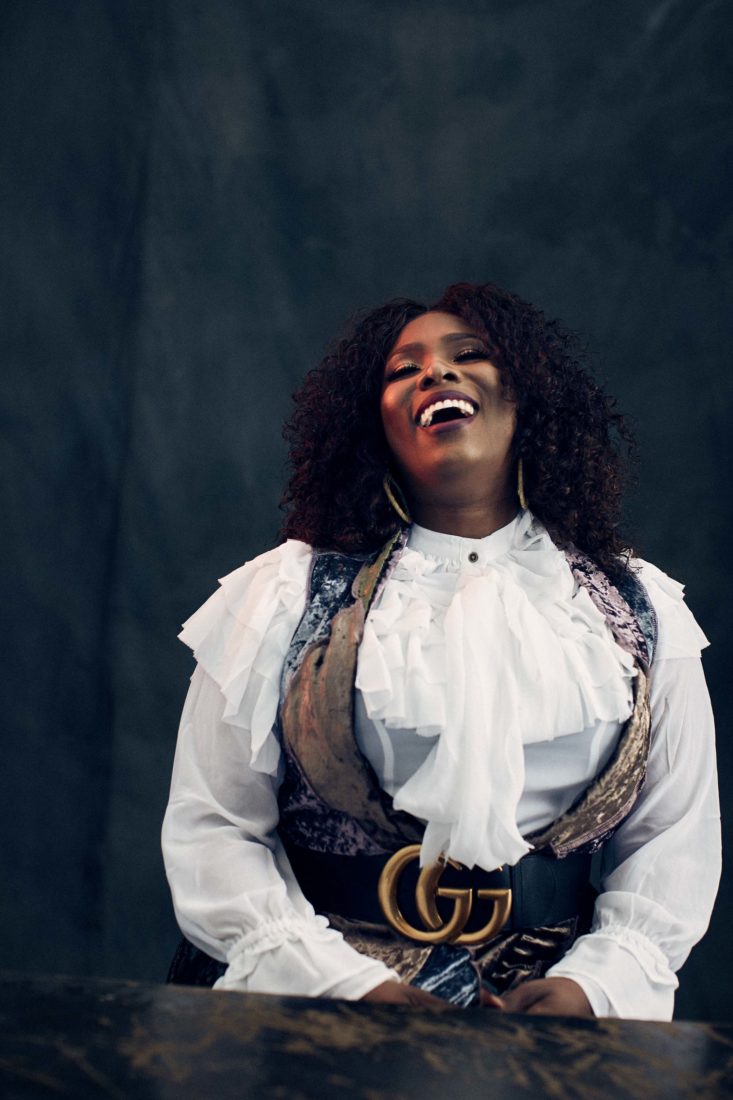
Photo: Sully Sullivan
Quiana Parler, vocalist.
“I never knew what style of music I wanted to record as an artist,” Parler says. “But Ranky Tanky—it’s music with a purpose.”
“We’re ambassadors for a whole culture,” Singleton adds.
“The root,” Parler says.
“Yes,” Singleton says, and nods. “The struggles.”
The songs of Ranky Tanky spring from Gullah culture, from West Africa and the people forced here, from body beats in worship halls, from ghosts and elders and diviners. They are songs of praise, of freedom, of rebellion, of protest, of joy, of sorrow, songs that assert a culture, that say we are here, we are still here, we will be heard.
Going up to heaven, sing and shout
Ain’t nobody there to put me out…
That’s all right, that’s all right, that’s all right. It’ll be all right
My soul’s gonna sit up in the kingdom, that’s all right
To listen to Ranky Tanky is to be taken to church, yes, but it is also to be reminded of your secular humanity, to feel in your bones your mortality and the mortality of others, and how your mortality and theirs are inextricably linked; to be cautioned that none of us outrun death or tragedy, and how when death and tragedy strike, and those bones ache, you will need music that recognizes those truths and gives you a reason to keep walking forward.
Join the band, come along, come along, come join the band…
The lyrics are direct, simple. They penetrate like arrows. “We take nursery rhymes, old field songs, and we tweak them so this new generation can relate,” Parler explains. “The lyrics have a special meaning to me, because they’re from my ancestors and what we went through as slaves. This band has been the hardest for me emotionally onstage. You listen to the music and you can feel what the elders went through back in the day. Like no other music, these Gullah songs take me somewhere else.”
I been in the storm so long. I been in the storm so long
Singing, oh, oh Lord, give me more time to pray
You know I been in the storm so very long.
“You can’t promote your culture without an element of celebration,” percussionist Quentin Baxter, who is forty-seven, says as he drives his SUV through his old neighborhood of Charleston Heights. “We had no idea that we learned a separate language, that people in the larger world didn’t clap and play like us,” he explains of his musical origins. “This band really is an attempt to celebrate Gullah music outside of these expected environments.”
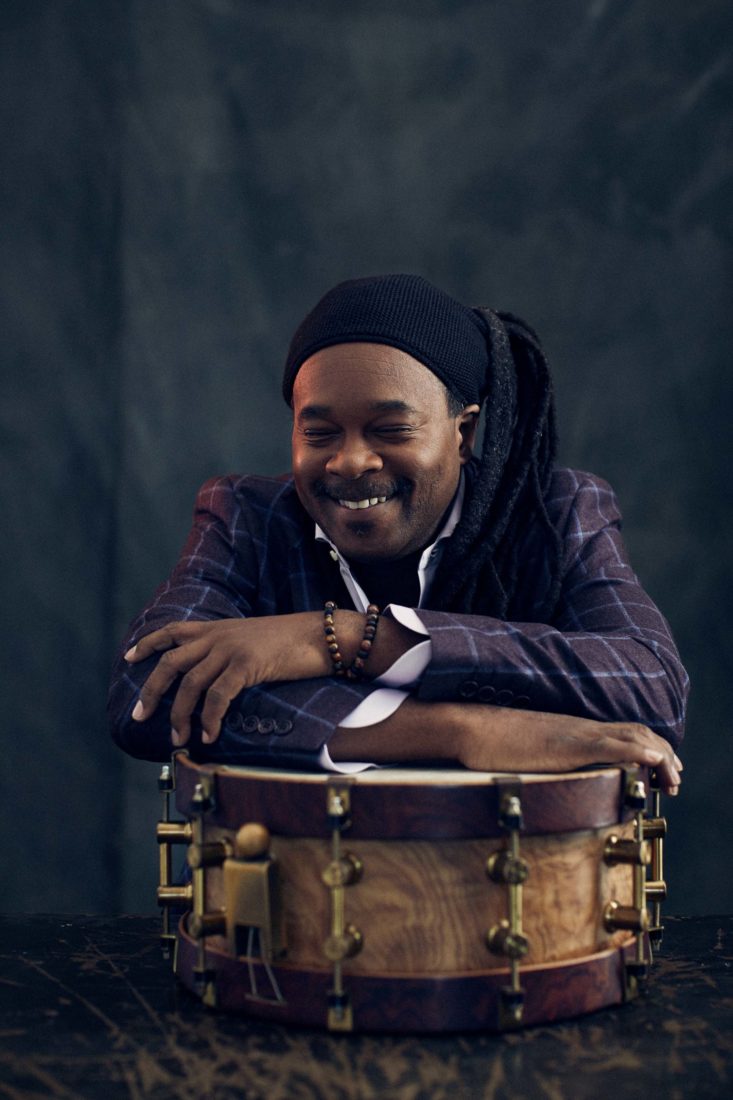
Photo: Sully Sullivan
Quentin Baxter, drummer.
Baxter brakes. “That’s my red-and-white house right here,” he says. He gestures to a window. “That was my bedroom. I had to learn how to play drums softly because I would practice till five, six o’clock in the morning.” Baxter grew up in the shadow of I-26, music “mandatory” in his home. His mother and father played drums, as did his two brothers. “Memory does not exist for me without having played a percussion instrument,” he says. At church revivals, his mother worked the snare, his dad rolling a big bass drum from the church kitchen, the rhythm of them playing together a hallowed sound Baxter longed to emulate.
“We had to learn how to play in all these different churches—Pentecostal, Methodist, Episcopal, AME, Baptist—and the best way to do that was listen to the oldest person in that church lay down some hand claps and then follow.” Baxter became so proficient at adapting to the musical idiosyncrasies of each house of worship, “if a church was built before 1985, I played in it.”
At fourteen, he was a featured drummer in his own congregation, his seat near the back window, which given the heat was usually propped open with a stick. “We got up to some music,” Baxter recalls, as he parks in front of his old church, a modest white single-story building next to an overgrown lot that used to host a juke joint. “We’d play the whole service. We’d play someone’s testimony.” The song would soar from the window like a breeze, and Baxter often saw neighbors line up outside to listen to him. The crowd gave his ego a lift, a pride his mother was quick to tamp down, reminding him his gift was just that, and “showing off” was not to be indulged. “I’ve never played just for myself since then,” Baxter, who has been nominated for Grammys twice for his work on other albums, says, nodding sagely. “I play for the message.”
As a young professional musician in his twenties, Baxter earned just seventy-five dollars a week. But he kept on, undeterred, his genius finding a home in jazz, Latin, experimental, and other forms of music. It was around this time that Baxter met Parler when he needed a singer for a variety show at the historic Charleston Music Hall. “Quiana came in singing jazz and scatting some Sarah Vaughan. I did not realize that this cute little girl with the lace dress and a ribbon in her hair had that in her. She stole the show.” (Parler, already a force to be reckoned with, was just fourteen years old.)
Though accomplished in many genres, Baxter believes Gullah music built him. “My parents taught me to start and end with identity. To let people know who you are.” He says he finds that identity most in the church songs of his youth, the cadences he feels as unmistakably and organically as his own heartbeat. Baxter reverses out of the church drive, turning back toward downtown Charleston. “Gullah is pure,” he says. “It serves as an underbelly or a substratum of several different styles of music. If it can be delivered, received in a way where it really touches people, well, we sure need something like that right about now.”

Photo: Sully Sullivan
The group gets into the music.
It’s a sentiment shared by Singleton, who was raised less than an hour from Baxter in Awendaw, a tight-knit, historically African American community, “where if I got in trouble down the street, I was likely to be disciplined down the street, and by the time I got home, my parents already knew about it.” Singleton was introduced to piano at three years old, his father needing a way to keep him entertained while his older siblings took lessons. “He made a deal with me: ‘Sit in the room, but you’ve got to be quiet, you can’t touch anything, you can’t fidget, you can’t get up.’” Singleton did as he was told and more, absorbing the notes, one day picking out a song that he’d heard on the keys. His parents, astonished, asked the teacher if he was too young to start lessons.
A prodigy, Singleton believed he would grow up to be a classical concert pianist and trained as such, practicing intensely every day, dropping his books at the door and rushing to the piano, where he played for hours, well into the night. “My mom always jokes that the piano was my babysitter.”
Talent came easily; he played several instruments by middle school, including the trumpet. Embracing performance took longer. His father a pastor, Singleton was sometimes called to fill in for the organist in emergencies. “I was terrified. I would walk out there a nervous wreck.” It wasn’t till graduating from college, when Singleton began playing jazz with Hamilton, Baxter, and later Ross, that his anxiety abated. He’s only grown more comfortable with their current band. “A few months ago, I was driving home, reflecting, and it hit me,” he says. “My grandfather and my uncle, they had this art of storytelling, they could captivate a crowd, take them on a journey. And that’s what I do with Ranky Tanky. I tell stories.”
The air is cooling, the sun dipping behind autumn leaves as Clay Ross and Kevin Hamilton stroll across the College of Charleston campus, marveling at both how much and how little has changed since they graduated in the nineties. The two were friends in school, and afterward they shared a nearby rental and tried to make ends meet as local musicians. “We were both hell-bent on taking our music game to the next level,” Ross, who is forty-two, says. “Jazz. Rock fusion. We wanted to be like Frank Zappa.”
Today the pair are headed to visit Hamilton’s parents at his childhood home on James Island, as Hamilton, who is forty-five, does most Sundays. His mother, Doris, usually prepares a spread: Ribs, baked chicken, and turnip greens grace the stove top, and pound cake rests under a glass dome. Ross hugs Doris warmly, then loads up a plate and sits at the table underneath photos of a young Hamilton looking adorable and not a little embarrassed. Doris remembers her son squirreling himself away for hours in his bedroom, practicing guitar riffs. “He had a Michael Jackson phase,” she recalls, chuckling. “You knew not to bother him when he was playing.” His dad, Bernard, chimes in: “I bought the guitar!”
Hamilton’s own memories of his youth center around parties Doris and Bernard threw, “the quintessential 1970s smoke-filled rooms full of people dancing and singing.” Hamilton would observe the gaiety from afar, struck by the “feeling of it, the harmony. That was music to me.” He also fondly recalls the mornings his mother would put on Roberta Flack and Aretha Franklin albums and clean the house. “That’s more church to me than church,” he says, smiling.
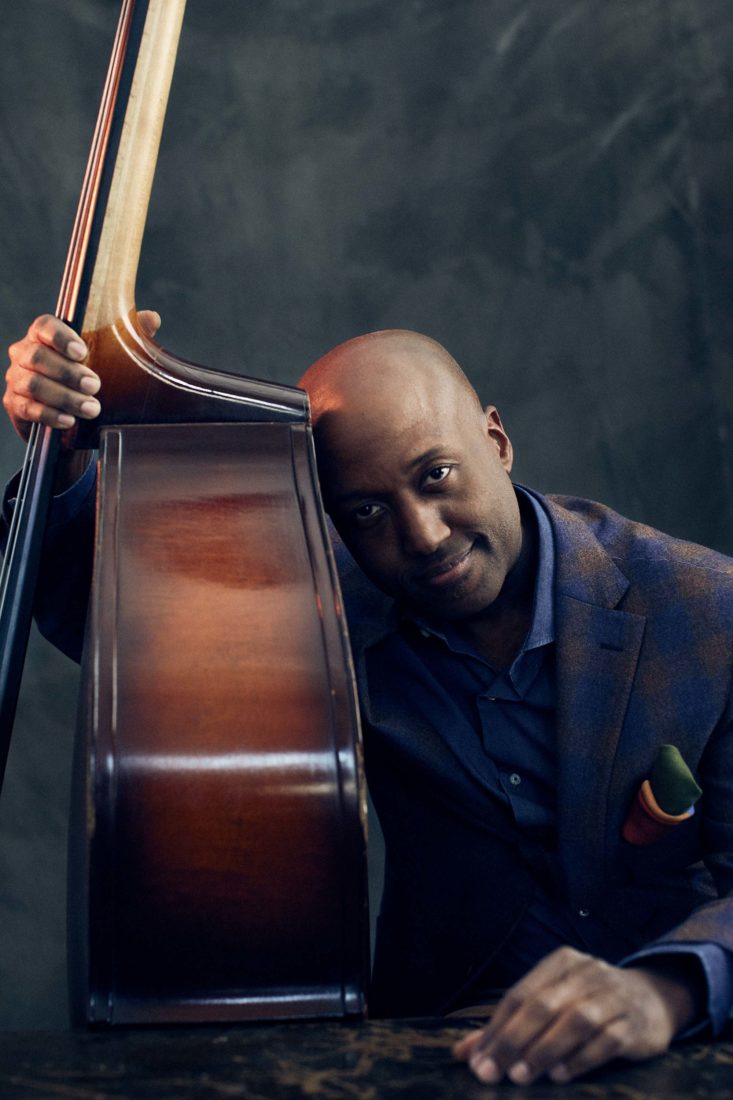
Photo: Sully Sullivan
Kevin Hamilton, bassist.
Hamilton, shy and modest then and now, learned the bass at fifteen after a friend said he needed a player for his band. His new skill got him out of his bedroom and in front of crowds. By age twenty, he was good enough to support himself through college. “Everybody else in the band started in church,” Hamilton says. “I did it the opposite way, where I’m finding the church part now.” It’s an experience he’s witnessed, too, in the crowds when Ranky Tanky plays outside of the South. “I’ve never seen our music go over anybody’s heads. Everyone gets it. That’s what’s important about Gullah music—it brings everybody together. You feel included.” Ross agrees. “Gullah is just a very direct expression,” he says. “There is a timeless quality about this music.”
Ross shares a lesson a professor taught him back in college, in which he was told to imagine all the music in the world stopping, and how that would instantly deaden the human experience. “I think about that a lot because Gullah has this human resilience embedded in it. It’s not superfluous. It’s an absolutely necessary music.”
For Ross, this is less new ground than a homecoming. “I spent a lot of time as a musician seeking something new. I traveled the globe trying to find my identity.” After successful stints in funk, folk, world, and blues bands, “I realized everything I love about music lives in my backyard, lives in the people who are the closest mentors of my life, who are my dearest friends.”
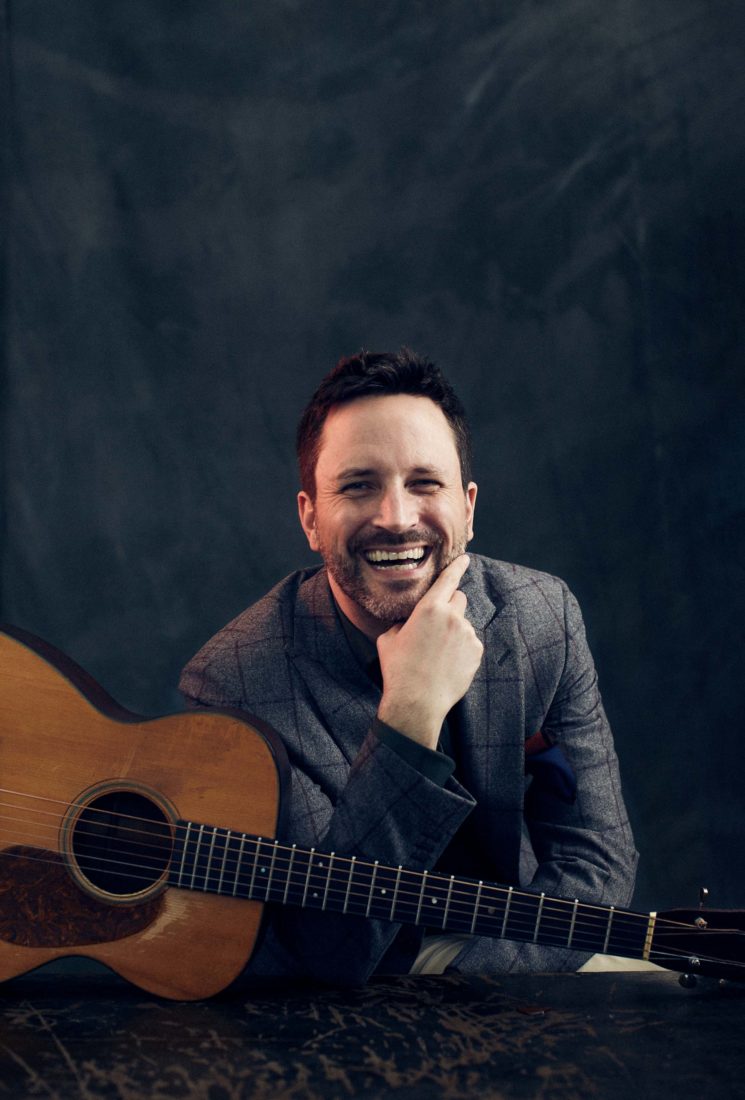
Photo: Sully Sullivan
Clay Ross, guitarist.
Ross describes his early career as “ambitious” with a hint of shame. “There was a time when I was a little bit much, my energy too intense even for these guys. They would jokingly call me ‘Clay Ross Productions.’” Ross shrugs, says he could never have played Gullah music with as much humility, depth, and understanding as a younger man. “I had ideas and passion, but it wasn’t for the right reasons. When I started exploring Gullah, it was as if all these pieces of my life fell into place. Gullah music is so much more than just music. It speaks to the essence of all of us.”
That epiphany motivated Ross to form Ranky Tanky, to cajole his old collaborators to join him in bringing Gullah music to the masses. “We have charged ourselves with championing this music that carries the weight of a living culture,” Ross explains. “So we’re always working to serve a purpose higher than our own personal wants or needs. We are doing our best to humble ourselves before this ideal that is bigger than any one of us.”
The members of Ranky Tanky take the missionary aspect of their band seriously. They know they are not playing bubblegum pop or country or even jazz. As Hamilton sums up, “We have to really get our shit together to do this music right.”
No one seems to mind the additional responsibility. Ranky Tanky’s success has brought with it a reconnection. Parler says she has never felt the songs she is singing as deeply. Ross feels more creatively invigorated and centered than he has in years. Baxter says he’s “decided to put down even firmer roots.” He’s building a youth center for music education, production, and performance on the street where he grew up. He plans to name it after his parents.

Photo: Sully Sullivan
It is late in the evening, and the band is sharing Sunday dinner at the Charleston Grill, their meal interrupted by locals who swell with pride that a hometown team has not just found international acclaim, but is spreading the gospel of Gullah to parts unknown, amplifying and celebrating a distinctively Southern sound and message, a portrait of the best of what the modern South can offer, can be—faithful, buoyant, accountable, reparative.
The conversation turns to life on the road, with gentle teasing and the sharing of well-trodden anecdotes found only among friends who know each other like family. Live jazz plays and the band can’t help but tune in, giving kudos to the arrangements, the thread of music running like a river through them, spilling into the sea.
By the time the meal ends, the Ranky Tanky crew are the last to leave the restaurant. They linger outside, making plans, hugging one another good night.
Earlier, Parler told a story about how, during performances, they do a back-and-forth with the audience in which they ask fans what kind of pain they have, then tell them they’re going to heal them. There was one woman recently who said she had “pain all over” her. After the show, she approached the stage.
“She asked us to gather around,” Parler said, “and told us she had planned to end her life that night, but after being there she didn’t want to anymore.” Parler shuddered a little, as Singleton wrapped an arm around her shoulder. “I just hugged her,” she said. “Like, don’t give up. Never give up.”
Parler sighed. “You never know what people are going through,” she continued. “But I will say this, this music, delivered with the feeling of our Gullah ancestors, is healing. And that, more than the awards or the tour or anything else, is how I know this is where we’re supposed to be.”


